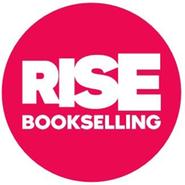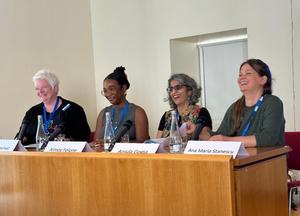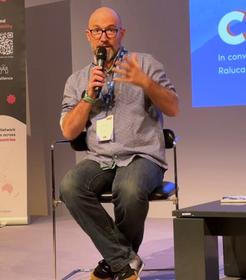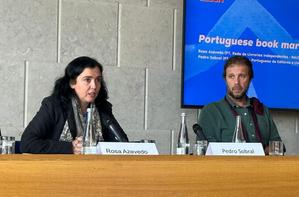 At a Sunday morning panel at the RISE Bookselling Conference taking place in Lisbon, Portugal, this week, booksellers from the U.K., Canada, and Spain discussed their experiences curating diverse and inclusive selections of children's books. Iris Hunscheid, the owner of two bookstores in Germany, moderated the discussion.
At a Sunday morning panel at the RISE Bookselling Conference taking place in Lisbon, Portugal, this week, booksellers from the U.K., Canada, and Spain discussed their experiences curating diverse and inclusive selections of children's books. Iris Hunscheid, the owner of two bookstores in Germany, moderated the discussion.
Aimée Felone, co-director and founder of Round Table Books in London, England, recalled that about five years ago, the conversation about inclusivity in publishing was beginning to get "very loud," and following George Floyd's murder in 2020, publishers rushed to acquire and publish Black voices. But four years later, the conversation about inclusivity is a "whisper," and the intention that seemed so widespread in publishing in 2020 and 2021 has all but "disappeared."
Felone noted that the publishers who were always committed to publishing diverse voices are still doing so, but finding representative titles from the big houses has become "difficult again." While the situation is broadly better than it was, "huge gaps" still remain for certain topics and age groups, and booksellers "still have to hunt."

|
|
| Panelists (from left) Iris Hunscheid, Aimée Felone, Anjula Gogia, Ana Maria Stanescu | |
Anjula Gogia, manager and events coordinator at Another Story Bookshop in Toronto, Canada, said there were certainly "more offerings" available today than there used to be, but it's not always clear if these new children's titles are "own voices" or not. And while there have been advances with picture books and YA books specifically, she and her team "see a gap with chapter books." Very few are written by people of color, and there are "almost none" about queer topics.
Ana Maria Stanescu, co-owner of KosmoKids in Madrid, Spain, said she and her team, who are all teachers, source books first based on what customers need, and then "books that we like." There is very high demand for children's titles about neurodiversity, as well as titles about nontraditional families. She added that historically there has been hesitance and reluctance in Spain when it comes to diversity and inclusion, but "every day it's getting easier" for people to understand the importance of including "nontraditional things."
Asked about book bans, Gogia said the situation in Canada is not as drastic as in the U.S., but it is "growing" and the "backlash is coming." She mentioned the Waterloo Catholic District School Board in Ontario, which last year was revealed to have "shadow banned" children's books that feature LBGTQ characters or discuss related subjects. It is only a "very vocal" minority that is fighting for things like this, she explained, but the danger is that they are campaigning to be trustees on school boards.
Felone, meanwhile, said that in the U.K., book banning has not reached a "vocal level," but there are individual teachers and schools increasingly deciding to not engage with diverse books. Stanescu said the situation was much the same in Spain.
---

|
|
| Manu Causse | |
During Sunday's afternoon keynote, author Manu Causse appeared in conversation with Raluca Selejan, co-owner of La Două Bufniţe in Timisoara, Romania. Causse discussed his lifelong love of bookshops, which he called his "home"; his career as a writer; and his experience of having his YA novel Bien Trop Petit (Way Too Small) banned in France.
Causse explained that the book had initially been marked as suitable for ages 15 and up, but a government committee reviewed it and ruled it to be unsuitable for anyone under the age of 18, meaning that booksellers had to check the IDs of anyone buying it. Causse noted that the ban effectively shined a "spotlight" on the book, and its sales increased by more than tenfold. Publishers, booksellers, and other authors also roundly criticized the ban.
In the keynote's q&a portion, a French bookseller commented that she and her colleagues were "shocked" to hear the news of the ban. She was dismayed that a "smartly written" book was banned while titles that have actually harmful messages remain on display tables and can be purchased by anyone. She remarked that Bien Trop Petit was originally in the shop's youth section, but after the ban, they were "obliged" to move it about two tables away.
---
 |
|
| Rosa Azevedo and Pedro Sobral | |
With a population of just over 10 million, Portugal is a relatively small book market. It publishes many titles in translation and is steadily shifting from a tradition of buying books as gifts--that aren't necessarily read--to a true reading culture, as outlined at a Sunday session featuring Pedro Sobral, president of APEL, the Portuguese publishers and booksellers association, and Rosa Azevedo, head of ReLI, the independent booksellers association.
In 2022, the Portuguese book market had sales of 175 million euros (about $190 million), which more than made up for the substantial sales drop at the beginning of the pandemic, when severe lockdowns hurt the book business in Portugal. Sobral called the sales growth "a big surprise," in part because in the decade before the pandemic book sales grew only about 1% a year.
There are nearly 300 publishers in Portugal, publishing books "in every segment you can imagination," making for "very diverse" offerings. Booksellers include four large chains, nine "multiproduct" retailers, independents, and a variety of supermarkets, which are still important for book sales. Readers overwhelming prefer printed books, and a vast majority shop at least sometimes in bricks-and-mortar stores.
Recent studies have shown that traditionally Portuguese book buyers often buy books as gifts. A study of purchasing habits showed that in 2022, 62% of Portuguese bought books but 61% of the population had not read a book that year. As Sobral said, "Reading habits have been low." However, a positive effect of the pandemic has been to boost reading for its own sake, leading more people, especially younger people, to read and begin creating "a new reading culture."
Azevedo noted that her independent bookshop association has some 60 members, and that while independent bookshops face a range of challenges--discounting by competitors, unfavorable terms, a lack of government support, and a slow economy, among them--indies are "no longer a small slice of the market." In much the same way as in the U.S., many new indie bookshops are opening. They tend to be small and have very particular focuses that reflect the passions and interests of their owners.
---
At the end of the conference yesterday, it was announced that next year's conference will take place in Riga, Latvia, March 23 and 24. --Alex Mutter and John Mutter

